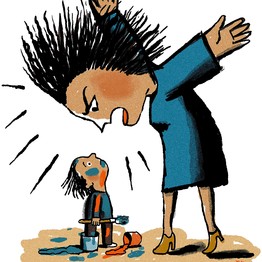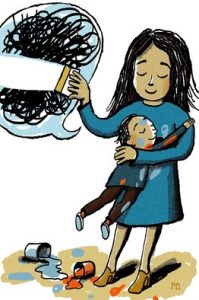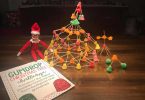When I pictured what kind of mom I would be it was a mix of Maria from the Sound of Music, June Cleaver and Lorelai Gilmore. Little did I know I would end up being a mix of Marge Simpson, Lois of Malcom in the middle and a bit of Frankie from The Middle. I also didn’t expect to have a kid with ADHD.
The past few years as my kids are getting older I find some weeks I get so frustrated I yell. Afterwards when my throat is sore I am filled with guilt. Always balancing a tightrope of whether he is not behaving because of ADHD or I’m just being too lax or tough on him is frustrating to deal with. Sometime I raise my voice to get the kids attention, and sometimes it’s downtright lifesaving, like when he is going into oncoming cars on his bike and looking backwards.
But that’s ok right? I always told myself it was because I love them so much and they need to have boundaries and it’s over simple things like cleaning their room and never an insult or defamatory. Right? Then one day I heard my husband yell at our kids and I lost it. Being a 3rd party listening I realized no matter what the reason this had to stop.

photo from: www.wsj.com
The Wall Street Journal had an interesting article that cited the damages yelling is doing to our kids and it woke me up. One study suggests yelling at children may have consequences that go beyond those of spanking. Eight-year-olds whose parents disciplined them by yelling have less satisfying relationships with romantic partners and spouses at age 23, according to a 15-year study led by Stephanie Parade, an assistant professor of psychiatry and human behavior at Brown University. “Parents who yell may miss out on a chance to teach children to regulate their emotions,” she says.
The negative effects of yelling weren’t erased by parental warmth, however. The negative problem-solving tactics that children learn when their parents yell may stick with them as adults, says the study, published in 2012 in Marriage & Family Review. Children also may expect others to treat them in a negative way, and unconsciously pick partners who fulfill that expectation.
Author of parental anger book ‘She’s Gonna Blow’, Julie Ann Barnhill, says that “yelling is where 90% of parents do most damage”. She herself used to yell at her kids up to 3 times a week when they were preschoolers. Then she got counseling to control her anger so that she can discipline her kids in positive ways.
What to do when parents are faced with a blow-up/explosion that can lead to yelling:
- Learn the signs that a blowup is about to happen and dial it back. Warning signs include: tightness in the throat or chest, shallow or rapid breathing, a clenching of the teeth or jaw, negative thoughts about oneself or feelings of being overwhelmed.
- Get yourself out of the negative. Take a deep breath. Envision your favorite relaxing place. Count to 10… basically think of the things you tell your children to do all the time. The reality is getting angry doesn’t make things better. For me I bite down on my index finger. I may have a callous that can stand up to any knife now, but it’s saved me a lot of yelling and cursing.
- Build in buffer time. My husband always laughs at me because I am always saying we have to leave 10-30 minutes before we actually do. It doesn’t mean we still aren’t running out the door at the last minute. But now we have that extra time to clean up messes, or find my daughter socks…. why does she never have socks on?
- Shift the anger. Rather than starting with ‘you’ which usually follows on what kids are doing wrong. Instead try starting with ‘I’. “I am not happy that you threw your backpack across the room and would like you to pick it up and put it away please.”
- Don’t take it personally. Studies show parents take their child’s misbehavior personally. They feel attacked or think it’s a reflection on their parenting abilities. Also parents who see a child’s outbursts as unexpected and overwhelming tend to feel more frustrated and threatened with each new outburst. This fuels emotional reactions such as yelling. When dealing with an ADHD kid remember a lot of what they do is out of their (or your) control so set realistic expectations. You need to teach them boundaries and help them deal with it… and as stated above, yelling doesn’t do much to help that.

photo from: www.wsj.com
All parents, not just those with ADHD kids, can turn the situation into an opportunity to teach their children (and themselves) a better way to solve the problem. Your kids will grow up to be adults you might as well help them not repeat your errors.
For those times when you lose yourself and yell, remember apologizing can do a lot to fix the parent-child relationship. This also shows your child a positive way to deal with difficult situation and that you care about their feelings. Work with your kids to find solutions to problem. This gives the child a voice about how to prevent repeating the same behavior in the future.
Read the full article here.








